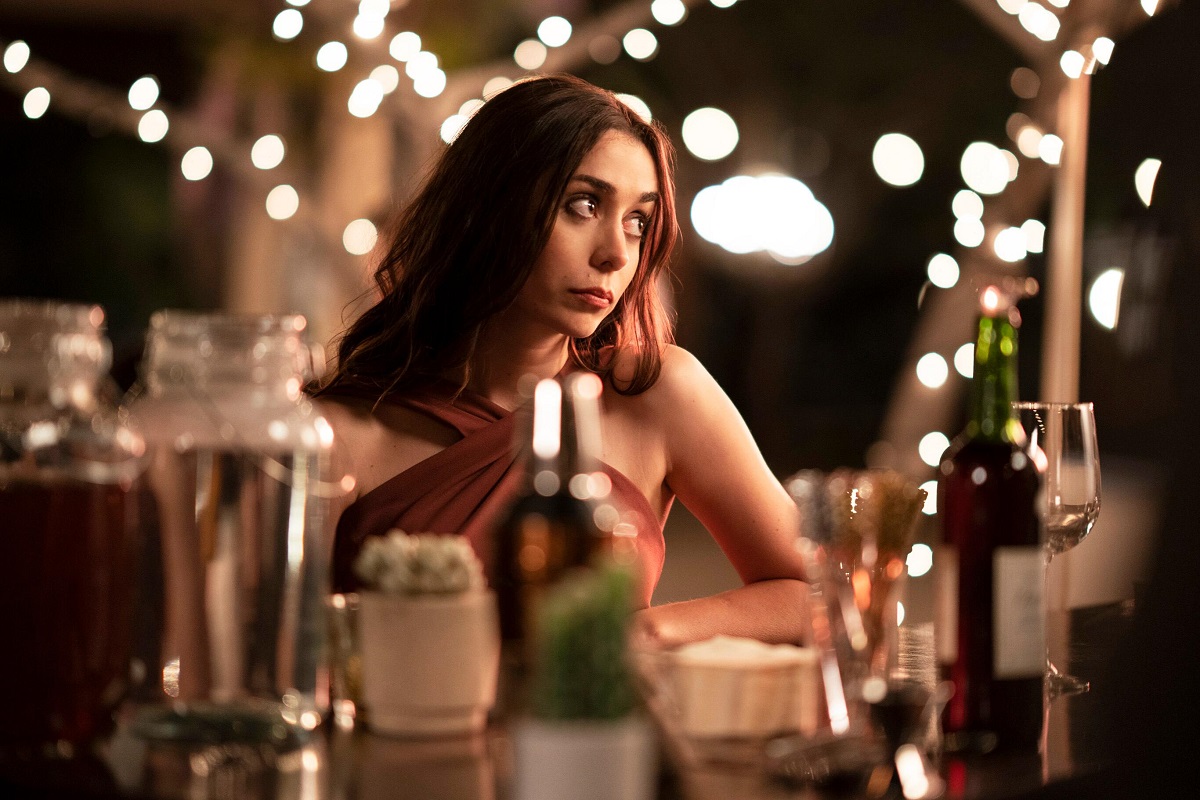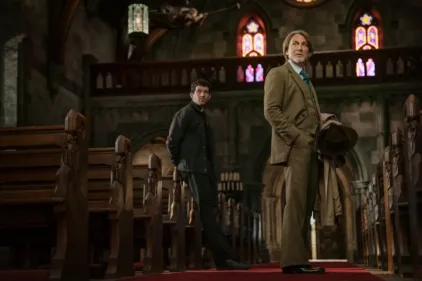Cristin Milioti has developed a following on stage and on television, but the film world hasn’t really given her the same chance, until Friday. That’s when “Palm Springs” drops on Hulu. After audiences flipped for the film at Sundance back in January, a bidding war ensued that saw the film net a record price. Yes, it’s the most any studio has ever paid for a film that premiered at Park City, and Neon was ready to launch this joyous little flick in theaters around the world … and then everything stopped. Now, people will be able to appreciate a film about repeating the same day over and over again a bit differently than anyone could have predicted, and they’ll do so from home when the film drops on Hulu on July 10th.
Milioti plays the sister of the bride at a California wedding, who finds herself stuck in a time loop a la “Groundhog Day,” reliving the same day, but she’s got a companion in Andy Samberg’s Nyles. Part romantic comedy, part screwball comedy, and part existential commentary, “Palm Springs” is clever and fun, two things not a lot of movies have been since the world shut down. A lot of that can be traced back to the prodigious charms of the two leads, neither of whom have ever been better on film. Milioti gave us a call from her place in this chaos to talk about what she’s been doing during the quarantine, how theater makes her a better actress, the overwhelming Sundance response, and the greatness of Laura Dern.
How have you been spending your time during quarantine?
I’ve been doing a lot of reading, seeing a lot of people on FaceTime, going on a lot of long walks with my dog. I’m trying to become as active an ally as possible. I’m trying to educate myself. I’m reading White Fragility by Robin DiAngelo, I’m going to protest marches, I’m calling Senators. I’m doing everything I can. Things I wouldn’t normally have the time to do.
It’s amazing how that plays a part. How time impacted the response in terms of mobilizing people.
Yes. I think it’s the silver lining of it. People, with work and life have so many distractions. We were made to sit down and look at what’s been happening for years. We had nowhere to run. We couldn’t say, “I have to go to work now.” So we had to look at it and look at our own part in it. What a privilege to learn about it as opposed to experience it.
You’ve done such a broad array of TV programs from “Fargo” to “Black Mirror” to “Modern Love” to “Mythic Quest,” and they all feel like shows that are trying to be unlike anything else on TV. They’re all really tonally unpredictable. They’re hard to define. Are you attracted to projects that can’t be easily pitched or put in a box?
Yes. Enormously. I really appreciate that. I do feel that way. I’m attracted to those things because I feel that way as a performer. I don’t want to be put in a box. I want to do every single possible thing I can. I want to do every type of role. I want to do every type of genre. I want to do it all. I think that possibly the things that I’m most attracted to as a viewer are in that realm as well. So that’s where my tastes lie.
Would you say that the first thing that attracts you to a project is the overall project or your character?
Both. Usually the first thing that draws my eye is the character, but it depends. If there’s like incredible people involved then I’m always extra intrigued. The character and the people involved are all you can control. I’ve been a part of things where I loved the character and the people and, for whatever reason, it hasn’t worked. The things that I can control, the things where I do have a choice, those are the things that really drive me.

How did you get involved with this project?
This was a very blessed experience. I had a general meeting with Andy and Becky Sloviter, our incredible producer. It was a meeting about collaborating on something as a producer or as a writer. We weren’t really sure. It was supposed to be half an hour and the meeting ended up being three hours long. We talked about everything under the sun. Couldn’t stop gabbing. I left there feeling like I had spent a beautiful afternoon with wonderful people. And a couple of days later, I got an email with the script. They asked if I would take a look at it and wanted to know my thoughts. I read it and flipped for it. I didn’t hear anything for a really long time then and I thought they found someone very fancy. I would check in about it every now and then with my agent. I let it go. Then I got a call out of the blue. It was that simple.
Had it come up in that meeting?
Not at all.
It had to have been on their minds in that meeting, don’t you think?
Yes. I mean, they can answer it better, but what I’ve gleaned from other interviews is that I was on their radar for it. I think then once we all sat down and took a deep dive that they felt like they got to know more on the level as a collaborator.
How then do you develop that collaboration with Andy? What’s your working dynamic like? He’s getting more interesting with each project.
Isn’t he incredible in this? I think he’s so so fantastic in this. I’ve been a big fan forever. He’s such a brilliant performer. He’s so funny but he has these emotional wells. I would love to see him in a drama. I was telling him that a lot when we were working together. He’s so good. Working with him was a dream. I was very blessed with never having to work at our chemistry. We hit it off in that meeting. We have very similar sense of humor and very similar tastes in what we like to watch and read and music we listen to. It was a blast. It was all sort of there. And that’s not always the case. [laughs] We had a blast filming so much of this movie. Even the heavier stuff, I felt that we both brought it. We both were willing to go to very uncomfortable places. I’m very excited for people to see this.
This was one of the biggest stories of Sundance. Did you go there knowing people would respond to it in the way they did or were you unsure?
A resounding, as-loud-as-I-can-say, NO IDEA that that was going to happen. We all went in hopeful that people would like it. The producers were like, “It would be great if we broke even.” Not in a million years. That first screening—and I know this sounds pretentious—it was like spiritual. We were all together. 400 people. No one knew what the movie was about. I watched the audience the whole time. It was so immensely validating. This business is unpredictable. That’s sort of its main trait. We’ve all had the experience of making things that we love and believe in and they don’t come together. That’s part of it. So to sit there and feel like I really like this but who knows? And then to see people flip for it? It was a dream.

You have an eclectic resume in terms of mediums, jumping from theater to TV to film. How does that change you or help you as a performer?
I think it does. Definitely. The stamina that theater requires is a great boot camp. Film and TV require a different type of stamina. With theater, there’s no editing to help you. No lighting. No score. It is you against the music. You’re up there as a company and you are the editor. You are moving the piece along on your shoulders. It takes a lot. It’s also an incredible pleasure. I do think getting to go between formats, I feel that it stretches me. Each project changes me. I learn something new from each experience. I wouldn’t have it any other way. I love jumping around from thing to thing and not being put in a box. I think it’s a privilege that you can be afforded as an actor. I didn’t get into this to do one thing.
Some people do though. Some people stay in theater or TV.
Totally! Totally. And there’s nothing wrong with that whatsoever. I just might have spiritual ADD. I think TV is amazing because it gives you the ability to sit with a character for a long time. It’s weirdly a lot like theater, except you get to see them go through an experience every day. But you get to sit with the character.
You gave me a natural follow-up by saying you learn something new from each experience. So what did you learn on “Palm Springs”?
There were a lot of lessons on this one. There are certain aspects, keeping it vague about the process because, in a way, I feel like the less you know about me the better I am at my job. I would say that there were things on this movie that pushed me to let go. Each experience does that. Acting can be the most embarrassing thing you’ve ever experienced. The MOST. Swallow your pride. Swallow your self-aware, cringing, inner critic. Also the pace—it was a constant hustle. We shot it in 21 days. We didn’t have time to be super-precious about anything. Most of the scenes I had two takes. You had to hit the ground running.
How much rehearsal?
A week and a half maybe. It was fast. There were a lot in there where you’re seeing my first or my second take. That was an incredible lesson in leaving it all on the dance floor. Why warm up? Come out of the gate swinging? What are you waiting for? I’m going to take that with me.
It won’t work for every project. David Fincher won’t let you do that.
[laughs] That sounds like my dream. I would do 800 takes. I find that to be like a dream.
I’m fascinated by the idea that getting too deep into process would change your job. Do you think actors who talk too much about what they do—it’s harder to put that aside when we see them in a movie or on stage?
This is my opinion but I think that sometimes when people know certain things about you or as an actor that it’s easy to project the person’s experience onto the character as opposed to letting the character have their own voice. I think that I like the idea that we’re able to commune as an actor and a viewer and have a similar experience and it doesn’t matter what we’re drawing from. We’re both alive and human and we connect over this thing. If you know exactly how it is I got there, or what I’m drawing from, or a lot about my personal life … I mean, it’s truly to each their own.
Who do you think does that well? Disguising process in a way that we get lost in the character?
God, I could list so many performers. The ones that come to mind are Frances McDormand and Laura Dern and I just though of Madeline Kahn or Kathryn Hahn or Joan Cusack—all these women that I don’t actually know that much about and I like that. Their work speaks for itself.












